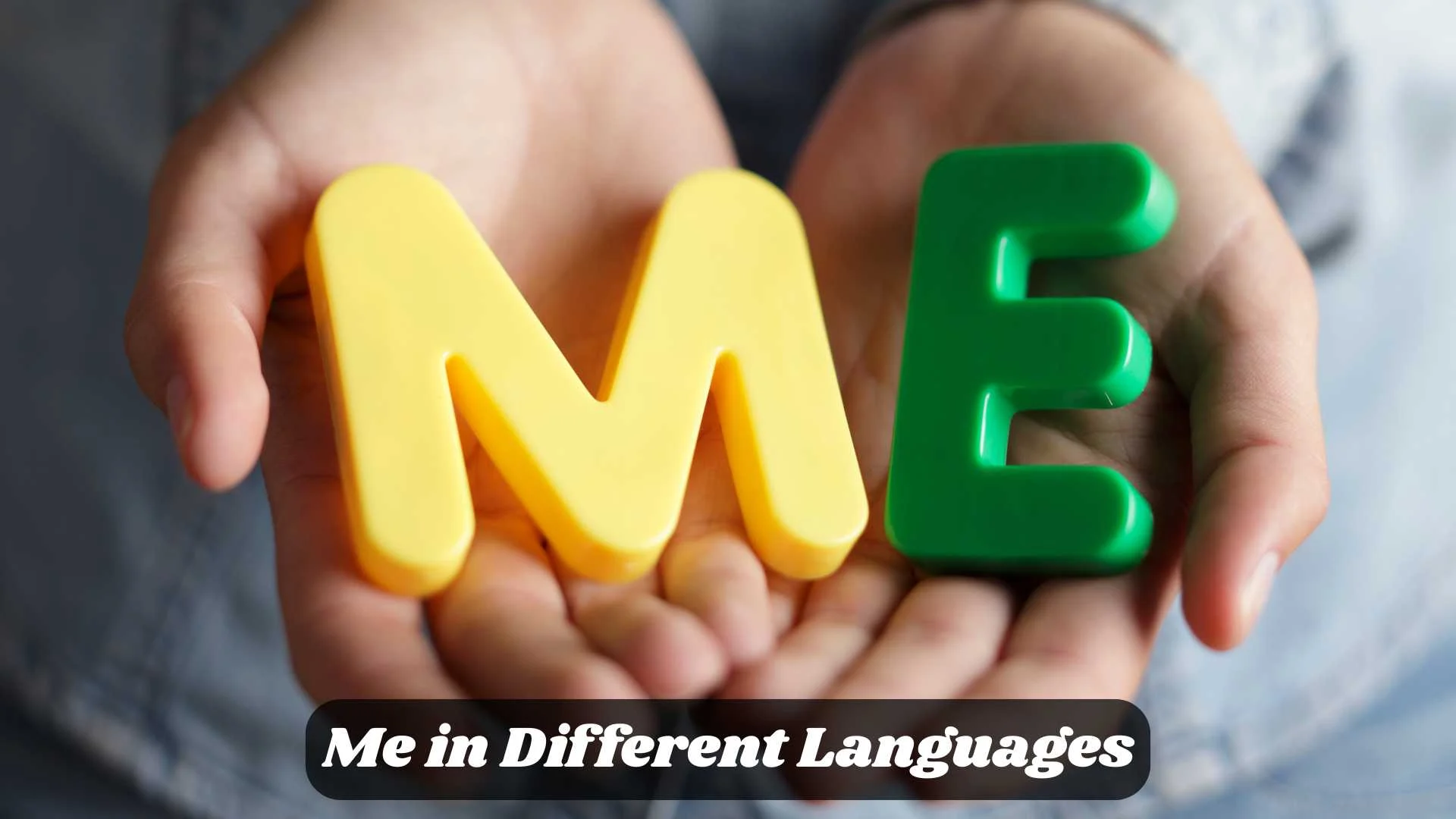Have you ever stopped to think about how the word “me” sounds in other parts of the world?
It’s one of the simplest words we use — yet it’s also the core of who we are.
In this article, we’ll explore Me in Different Languages, uncovering how this small but powerful word changes shape and sound across cultures while keeping its meaning close to the heart.
This guide is written just for you — someone who loves learning how language connects people.
As you read, you’ll discover how “me” is expressed in dozens of beautiful tongues, each reflecting a unique culture and way of seeing the self.
By the end, you’ll not only know how to say “me” in many languages but also feel a deeper connection to the universal idea of identity shared by all humans.
🌍 How to Say “Me” in 70 Different Languages
- English (🇬🇧) – Me | Pronunciation: mee
Example: It’s just me here. - Spanish (🇪🇸) – Yo | Pronunciation: yoh
Example: Yo te amo. (I love you.) - French (🇫🇷) – Moi | Pronunciation: mwah
Example: C’est moi. (It’s me.) - German (🇩🇪) – Mich / Mir | Pronunciation: mikh / meer
Example: Er sieht mich. (He sees me.) - Italian (🇮🇹) – Me | Pronunciation: meh
Example: È per me. (It’s for me.) - Portuguese (🇵🇹) – Eu | Pronunciation: eh-oo
Example: Eu te amo. (I love you.) - Russian (🇷🇺) – Меня (Menya) | Pronunciation: mee-NYAH
Example: Он любит меня. (He loves me.) - Chinese (Mandarin) (🇨🇳) – 我 (Wǒ) | Pronunciation: woh
Example: 我爱你. (I love you.) - Japanese (🇯🇵) – 私 (Watashi) | Pronunciation: wah-TAH-shee
Example: 私は幸せです. (I am happy.) - Korean (🇰🇷) – 나 (Na) | Pronunciation: nah
Example: 나는 너를 사랑해. (I love you.) - Arabic (🇸🇦) – أنا (Ana) | Pronunciation: ah-nah
Example: أنا سعيد. (I am happy.) - Hindi (🇮🇳) – मैं (Main) | Pronunciation: meh
Example: मैं तुमसे प्यार करता हूँ। (I love you.) - Urdu (🇵🇰) – میں (Main) | Pronunciation: meh
Example: میں خوش ہوں۔ (I am happy.) - Turkish (🇹🇷) – Ben | Pronunciation: behn
Example: Ben mutluyum. (I am happy.) - Greek (🇬🇷) – Εγώ (Egó) | Pronunciation: eh-GOH
Example: Εγώ σ’ αγαπώ. (I love you.) - Hebrew (🇮🇱) – אני (Ani) | Pronunciation: ah-NEE
Example: אני שמח. (I am happy.) - Thai (🇹🇭) – ฉัน (Chan) | Pronunciation: chan
Example: ฉันรักคุณ. (I love you.) - Vietnamese (🇻🇳) – Tôi | Pronunciation: toy
Example: Tôi yêu bạn. (I love you.) - Swahili (🇰🇪) – Mimi | Pronunciation: MEE-mee
Example: Mimi ni mwenye furaha. (I am happy.) - Zulu (🇿🇦) – Mina | Pronunciation: MEE-nah
Example: Mina ngiyakuthanda. (I love you.) - Polish (🇵🇱) – Mnie / Ja | Pronunciation: mnye / yah
Example: Kochasz mnie. (You love me.) - Dutch (🇳🇱) – Mij | Pronunciation: may
Example: Hij ziet mij. (He sees me.) - Swedish (🇸🇪) – Mig | Pronunciation: mayg
Example: Han ser mig. (He sees me.) - Finnish (🇫🇮) – Minä | Pronunciation: MEE-nah
Example: Minä rakastan sinua. (I love you.) - Hungarian (🇭🇺) – Engem | Pronunciation: EN-gem
Example: Szeretsz engem. (You love me.) - Czech (🇨🇿) – Mě / Já | Pronunciation: mye / yah
Example: Miluješ mě. (You love me.) - Romanian (🇷🇴) – Eu / Mă | Pronunciation: eh-oo / muh
Example: Mă iubești. (You love me.) - Ukrainian (🇺🇦) – Мене (Mene) | Pronunciation: meh-NEH
Example: Ти любиш мене. (You love me.) - Persian (🇮🇷) – من (Man) | Pronunciation: mahn
Example: من خوشحالم. (I am happy.) - Malay (🇲🇾) – Saya / Aku | Pronunciation: sah-yah / ah-koo
Example: Saya gembira. (I am happy.) - Indonesian (🇮🇩) – Saya / Aku | Pronunciation: sah-yah / ah-koo
Example: Aku cinta kamu. (I love you.) - Filipino (🇵🇭) – Ako | Pronunciation: ah-koh
Example: Mahal kita. (I love you.) - Danish (🇩🇰) – Mig | Pronunciation: my
Example: Han ser mig. (He sees me.) - Norwegian (🇳🇴) – Meg | Pronunciation: may
Example: Han ser meg. (He sees me.) - Slovak (🇸🇰) – Mňa / Ja | Pronunciation: mn-ya / yah
Example: Miluješ ma. (You love me.) - Slovenian (🇸🇮) – Mene / Jaz | Pronunciation: meh-neh / yahz
Example: Ljubiš me. (You love me.) - Bulgarian (🇧🇬) – Мен (Men) | Pronunciation: men
Example: Той ме обича. (He loves me.) - Croatian (🇭🇷) – Mene / Ja | Pronunciation: meh-neh / yah
Example: Voli me. (He loves me.) - Serbian (🇷🇸) – Мене (Mene) | Pronunciation: meh-neh
Example: Он ме воли. (He loves me.) - Bosnian (🇧🇦) – Mene | Pronunciation: meh-neh
Example: On me voli. (He loves me.) - Estonian (🇪🇪) – Mind | Pronunciation: meend
Example: Ta armastab mind. (He loves me.) - Latvian (🇱🇻) – Mani | Pronunciation: MAH-nee
Example: Viņš mani mīl. (He loves me.) - Lithuanian (🇱🇹) – Mane | Pronunciation: MAH-neh
Example: Jis mane myli. (He loves me.) - Maltese (🇲🇹) – Jien | Pronunciation: yeen
Example: Jien kuntent. (I am happy.) - Icelandic (🇮🇸) – Mig | Pronunciation: meek
Example: Hann elskar mig. (He loves me.) - Irish (🇮🇪) – Mé | Pronunciation: may
Example: Is mise mé. (It’s me.) - Welsh (🏴) – Fi | Pronunciation: vee
Example: Ti’n garu fi. (You love me.) - Hawaiian (🇺🇸) – Au | Pronunciation: ow
Example: Aloha wau iā ʻoe. (I love you.) - Maori (🇳🇿) – Au | Pronunciation: oh
Example: Kei te aroha au ki a koe. (I love you.) - Afrikaans (🇿🇦) – My | Pronunciation: may
Example: Hy sien my. (He sees me.) - Amharic (🇪🇹) – እኔ (Ĕne) | Pronunciation: ih-NEH
Example: እኔ ደስተኛ ነኝ። (I am happy.) - Bengali (🇧🇩) – আমি (Ami) | Pronunciation: ah-mee
Example: আমি তোমায় ভালোবাসি। (I love you.) - Tamil (🇮🇳) – நான் (Naan) | Pronunciation: naan
Example: நான் மகிழ்ச்சியாக இருக்கிறேன். (I am happy.) - Telugu (🇮🇳) – నేను (Nenu) | Pronunciation: nay-noo
Example: నేను సంతోషంగా ఉన్నాను. (I am happy.) - Kannada (🇮🇳) – ನಾನು (Naanu) | Pronunciation: nah-noo
Example: ನಾನು ಸಂತೋಷವಾಗಿದ್ದೇನೆ. (I am happy.) - Malayalam (🇮🇳) – ഞാൻ (Njaan) | Pronunciation: nyahn
Example: ഞാൻ സന്തോഷവാനാണ്. (I am happy.) - Gujarati (🇮🇳) – હું (Huṁ) | Pronunciation: hoon
Example: હું ખુશ છું. (I am happy.) - Marathi (🇮🇳) – मी (Mee) | Pronunciation: mee
Example: मी आनंदी आहे. (I am happy.) - Punjabi (🇮🇳/🇵🇰) – ਮੈਂ (Main) | Pronunciation: meh
Example: ਮੈਂ ਖੁਸ਼ ਹਾਂ। (I am happy.) - Nepali (🇳🇵) – म (Ma) | Pronunciation: mah
Example: म खुसी छु। (I am happy.) - Sinhala (🇱🇰) – මම (Mama) | Pronunciation: mah-mah
Example: මම සතුටින් ඉන්නවා. (I am happy.) - Mongolian (🇲🇳) – Би (Bi) | Pronunciation: bee
Example: Би баяртай байна. (I am happy.)
🌎 Conclusion
No matter where you go, “me” is one of the first and most personal words you’ll ever say. From “yo” in Spanish to “wǒ” in Chinese, the word represents identity, feeling, and life itself. Learning it in 70 languages shows how every culture gives voice to the same universal self — me.

James Parker is a passionate and insightful American author known for his unique ability to connect complex ideas with everyday experiences. With a background in creative writing and over a decade of experience in the literary world, James has dedicated his career to inspiring readers through thoughtful storytelling and practical wisdom.
His writing style is modern, engaging, and deeply reflective, often focusing on personal growth, human relationships, and the subtle beauty of life’s challenges. James Parker’s work is highly respected for its authenticity and relevance, making him a favorite among readers seeking both knowledge and emotional connection.
Over the years, James has authored several impactful books, including “The Path Within”, “Finding Clarity”, and “Bridges of Thought”, which continue to resonate with audiences around the world.

